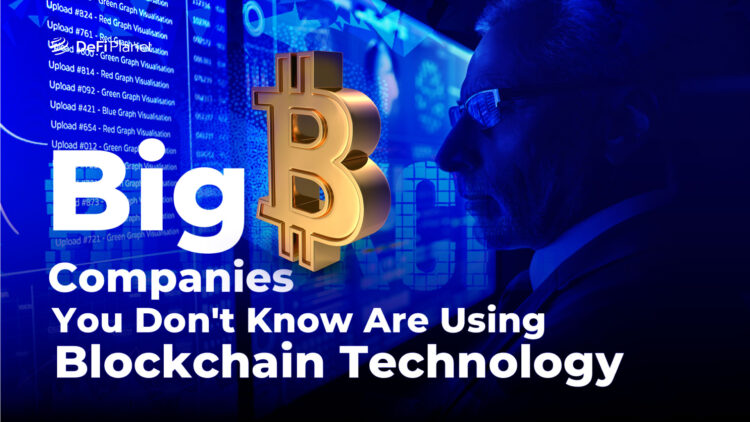You probably know blockchain as the technology behind cryptocurrencies and applications such as DeFi exchanges and NFT marketplaces. But it has more uses than you might think.
According to a report by Blockdata, 44% of mega-corporations that provide the products and services you use every day already use blockchain technology in the background. This might sound surprising, but it’s by design. Blockchain is intended to quietly solve everyday problems without needing you to understand complicated stuff, much like how we use the internet without getting into technical stuff like “data structures and algorithms.”
Many traditional companies, even if they’re not known for blockchain or Web3, use blockchain’s fundamental features, such as immutability and transparency, to create new solutions or improve their existing products for better service delivery.
These companies span various sectors, including technology, logistics, banking, finance, telecommunications, fashion, healthcare, and more. One reason this might not be common knowledge is that many of these blockchain solutions are privately managed.
This article provides a list of some well-known companies that have used or expressed interest in blockchain technology.
BMW
German luxury car manufacturer BMW is a prime example of a mega-corporation already leveraging blockchain technology. The company uses blockchain solutions to efficiently monitor its supply chain. BMW uses blockchain networks like Hyperledger Fabric and Quorum to monitor the Original Equipment Manufacturers (OEMs) responsible for producing the materials and components used in their automobiles.
Using blockchain technology, BMW ensures ethical compliance throughout its production processes, promoting transparency and efficiency. Additionally, BMW is a member of theMobile Open Blockchain Initiative (MOBI), which includes other leading automakers.
MOBI is a non-profit group dedicated to exploring how blockchain can enhance transparency and trust among users, reduce the risk of fraud, and cut down on transaction costs in the automotive industry.
The initiative aims to achieve these goals by harnessing blockchain technology to create an ecosystem that supports Web3 infrastructure and Internet of Things (IoT) commerce.
Citigroup
Citigroup’s interest in blockchain technology dates back to 2015, when the financial service provider began experimenting with creating blockchain networks and cryptocurrencies.
The bank has stated that its objective is to evolve into a platform that seamlessly facilitates cross-border payments via blockchain. To achieve this, Citigroup collaborated with industry titans like Nasdaq, ConsenSys, and Goldman Sachs to improve its financial service offerings. In 2018, they also played a role in founding and investing in Komgo, a trade finance platform offering blockchain solutions.
Citi has now integrated Komgo into its core operations to speed up processing, reduce the risk of financial fraud, and minimize human errors. The firm is also digitizing the trade and commodities finance industry using Konsole, another product from Komgo, to issue Letters of Credit (LC).
In March 2023, Citi India, an subsidiary of Citigroup based in India, used Contour, a digital trade finance blockchain network, to issue a client a letter of credit (LC). This process, which typically takes several days, was completed in less than 3 hours. Citigroup managed to process transactions faster and more securely, all without sacrificing the integrity of the transaction.
FedEx
The global courier and logistics company began exploring blockchain technology for supply chain management and logistics in 2018. It joined the Blockchain in Transport Alliance (BiTA) to collaborate with industry peers on blockchain solutions.
FedEx formed a strategic partnership with Hyperledger, a reputable institutional blockchain network, to further strengthen its position and explore blockchain’s potential for improving its services.
FedEx employs blockchain technology to enhance customer trust by offering transparent shipment tracking. This allows you to easily track your package’s journey right up to your doorstep. Furthermore, it expedites dispute resolution by swiftly accessing on-chain data, enabling a quick assessment of situations and the identification of any issues that may arise.
In addition to developing consumer blockchain solutions, FedEx also invests in promoting Web3 education. It has partnered with the Blockchain Research Institute and INSEAD (Institut Européen d’Administration des Affaires) to launch blockchain and Web3 courses on Coursera.
JP Morgan
JP Morgan, the world’s largest credit card processor, is among the renowned companies utilizing blockchain technology. Like Citigroup, the firm has been actively exploring blockchain technology since 2015.
JP Morgan initially tested blockchain for faster currency clearing and settlements, which led to the launch of Quorum, its Ethereum-based private blockchain.
JP Morgan made history in 2019 by becoming the first bank in the United States to launch its own digital token, JPM Coin. Each JPM Coin is equivalent to $1 and operates on the Quorum blockchain. JPM Coin is available to institutional clients and JP Morgan-approved investors, simplifying secure transactions, international payments, and corporate treasury services.
Subsequently, JP Morgan launched Onyx, a robust blockchain network allowing institutions to easily share payment data and exchange various digital assets. The Central Bank of Bahrain recently tested JPM Coin on Onyx for real-time payment services.
JP Morgan has also ventured into the metaverse by launching the Onyx Lounge in Decentraland, a blockchain-based 3D virtual world.
Over time, JP Morgan has harnessed blockchain to reduce costs, expedite transactions, and improve financial processing efficiency. The bank has announced plans to integrate tokenized assets into its services.
Nestlé
The multinational food and beverage company is a part of the IBM Food Trust initiative, which comprises a group of companies utilizing blockchain technology to enhance transparency and traceability in the food supply chain.
Nestlé employs blockchain technology to oversee its supply chain for the procurement of farm and food-related products. This ensures that the company adheres to ethical practices in food production while also maintaining transparency for consumers and regulatory bodies.
For instance, Nestlé enables consumers to trace the origin of its premium coffee brand, Zoégas, by simply scanning the packaging barcode. With this, consumers can access information regarding the harvest times of the coffee seeds used in the product, the shipping procedures, and other essential production details.
Pfizer
The pharmaceutical giant is part of two important groups: the MediLedger Network, dedicated to improving pharmaceutical supply chains using blockchain technology, and the Pharmaledger Association, a non-profit organization backed by the European Union.
Pfizer uses the MediLedger Network to closely monitor the drugs they produce, ensuring adherence to ethical standards at every stage, from production to packaging and distribution.
They also use this system to tackle the problem of counterfeit drugs, which are a serious threat to both the pharmaceutical industry and consumers’ health.
Blockchain’s immutability and transparency help Pfizer ensure that it only distributes authentic drugs that work as intended and are safe for consumers.
Beyond their current healthcare service delivery enhancements with blockchain, Pfizer invests in other innovations using blockchain technology to improve healthcare.
In January 2023, Pfizer led a $4.1 million funding round for VitaDAO, a decentralized science (DeSci) startup focused on longevity research. This partnership marked the first time a pharmaceutical company teamed up with a decentralized science organization.
Pfizer’s embrace of blockchain solutions establishes it as a significant catalyst for the use of blockchain technology in healthcare.
Sony
Sony, the multinational Japanese conglomerate known for its innovations in music, gaming, and more, has now ventured into blockchain technology.
Currently, Sony uses blockchain to manage copyright-related information for digital content. This Digital Rights Management (DRM) solution operates on an Amazon-Managed Blockchain network, providing transparency in monitoring digital content creation and data management as well as combating piracy and copyright issues. This versatile solution applies to e-books, music, films, and VR content.
Another example of how Sony uses blockchain is a feature in some of its games that allows players to own in-game assets via non-fungible tokens (NFTs) technology. Consequently, these in-game assets become blockchain-owned and can be transferred and used outside of the video game environment.
A subsidiary of Sony, Sony Global Education Inc., also uses blockchain to manage transcripts and scores via a digital platform.
Walmart
In 2016, Walmart kickstarted a blockchain-based project to reduce exposure to hazardous food products. The company focused on creating a transparent supply chain that helps maintain traceability of food products.
After launching a few pilot projects to test the viability of blockchain in the supply chain, Walmart partnered with IBM in 2017 to develop a food traceability system that helped improve the transparency of its supply chain. This system ensured that products entering Walmart stores met the industry’s ethical standards.
It is now mandatory for all suppliers of leafy green vegetables to Walmart to upload their data to the blockchain. Today, with a simple barcode scan, you can access comprehensive information about Walmart’s leafy vegetable products and their manufacturers.
Walmart’s use of blockchain technology makes tracing where food comes from much faster and cheaper. Instead of taking about a week, it only takes a few seconds. This helps find and fix any problems in the food supply chain faster.
In Conclusion,
- If you’ve ever wondered about the many ways blockchain technology is making a difference, here’s some clear evidence that it’s impacting products and services you use every day.
- It’s important to understand that this list doesn’t cover everything. It just highlights a few well-established companies that have embraced blockchain technology. Many other companies in various industries are either already using blockchain solutions or exploring how it can make their operations more transparent, efficient, and secure.
- Despite the uncertainty surrounding regulations in the cryptocurrency and blockchain space, it’s unlikely that this will deter mainstream industries from adopting blockchain technology. Most of these solutions are designed to comply with existing systems and regulations. Therefore, using blockchain technology in traditional sectors will continue to be a viable option.
Disclaimer: This article is intended solely for informational purposes and should not be considered trading or investment advice. Nothing herein should be construed as financial, legal, or tax advice. Trading or investing in cryptocurrencies carries a considerable risk of financial loss. Always conduct due diligence.
If you would like to read more articles like this, visit DeFi Planet and follow us on Twitter, LinkedIn, Facebook, Instagram, and CoinMarketCap Community.
“Take control of your crypto portfolio with MARKETS PRO, DeFi Planet’s suite of analytics tools.”





















